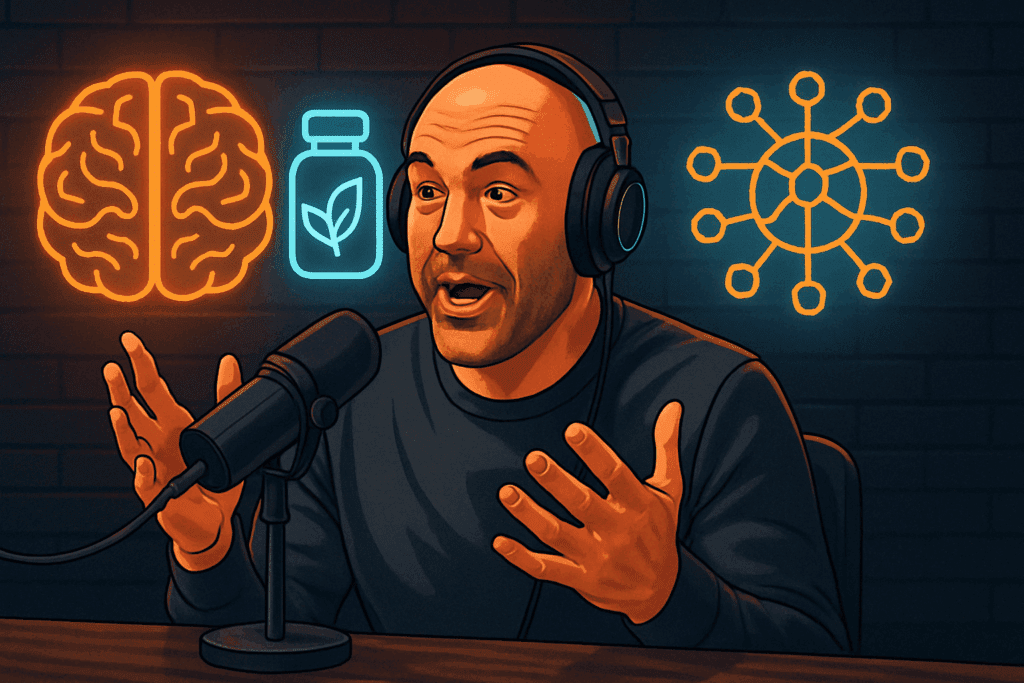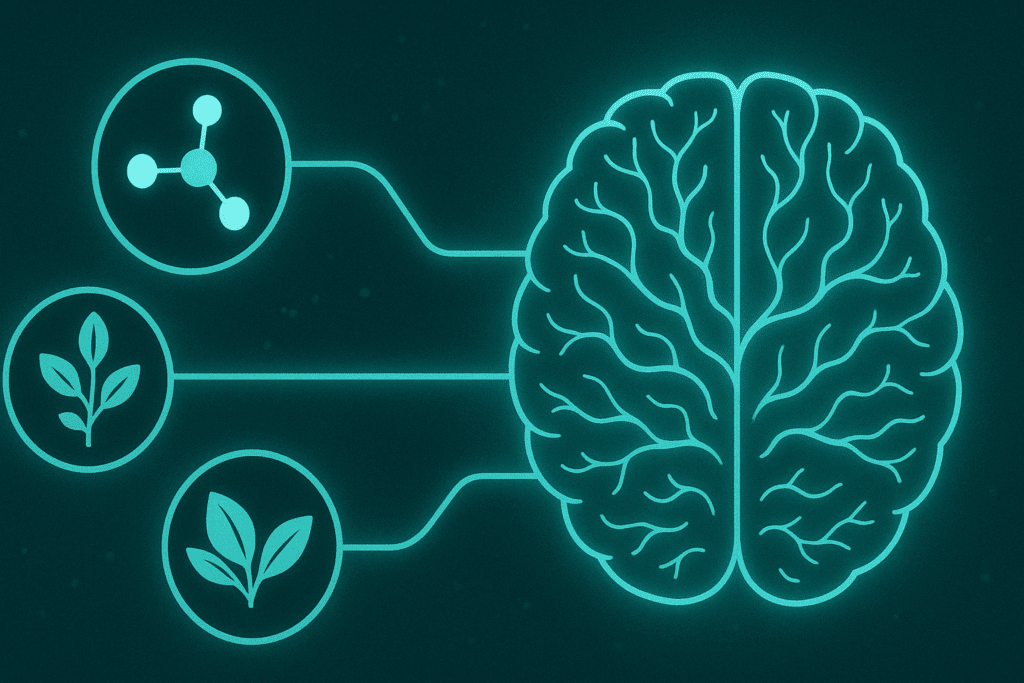Joe Rogan’s influence in the health and supplement world is undeniable. With millions of podcast listeners, a powerful media presence, and a passion for optimizing cognitive performance, Rogan has helped bring the conversation about nootropics into the mainstream. Whether he’s discussing ancient herbal remedies, cutting-edge compounds, or controversial brain-boosting supplements, his opinions carry weight with audiences looking to sharpen focus, enhance memory, and fuel decision-making. Yet for all the attention around these products, a key question persists: what nootropics does Joe Rogan take—and do they actually work?
You may also like: How to Choose the Best Brain Supplements for Adults: Science-Backed Ingredients That Support Focus, Memory, and Mental Clarity
Much of the spotlight has focused on Alpha Brain, the flagship product of Onnit, a supplement company Rogan has long been associated with. From clinical studies to lawsuits and questions about ownership, Alpha Brain has sparked both acclaim and scrutiny. At the same time, other supplements, including mushroom blends and neuro enhancers tied to Rogan’s health philosophy, have further expanded the debate about what really drives cognitive performance. This article explores the science, controversy, and reality behind Joe Rogan’s supplement stack. We’ll examine whether the nootropics Joe Rogan takes are backed by research, why Alpha Brain ended up in legal crosshairs, and how the truth compares with the marketing.

Understanding Joe Rogan’s Influence in the Nootropics Space
Joe Rogan has emerged as one of the most vocal public figures discussing cognitive enhancement through supplementation. Known for his insatiable curiosity and willingness to experiment, Rogan regularly shares his experiences with various nootropics and wellness products, turning what was once a fringe interest into a mainstream health conversation. Whether interviewing neuroscientists, biohackers, or athletes on The Joe Rogan Experience, he’s created a platform where discussions about mental clarity and brain optimization reach millions.
This unique platform has positioned Rogan as a thought leader in the space, influencing both consumer behavior and industry direction. His openness about using supplements like Alpha Brain, mushroom extracts, and adaptogens has added legitimacy to a market often criticized for exaggerated claims. But it has also opened the door for scrutiny—especially regarding whether Rogan is simply endorsing these products or genuinely using them for his own mental performance.
Many fans have asked, does Joe Rogan actually use Alpha Brain, or is it just a business move? That question matters because the intersection between influencer marketing and health products is a delicate one. When public figures advocate for supplements that claim to enhance cognitive function, the ethical implications are significant. The growing popularity of nootropics Joe Rogan takes has contributed to a broader cultural shift, but it’s also raised critical questions about evidence, safety, and scientific integrity.
Does Joe Rogan Own Alpha Brain or the Company Behind It?
One of the most persistent questions across supplement forums and search engines is, does Joe Rogan own Alpha Brain? While Rogan is widely credited with helping to popularize the product, he does not technically own Alpha Brain itself. The supplement is the flagship product of Onnit Labs, a company Rogan has strongly supported for years. Rogan has long served as a strategic partner and public advocate, and his influence has shaped the brand’s identity. However, he is not the founder or sole owner.
The confusion often stems from the fact that Rogan played a pivotal role in the growth of Onnit as a brand. He helped the company reach an enormous audience by frequently promoting its products on his podcast. In fact, many of the searches related to the joe rogan supplement company stem from the perceived closeness between Rogan and Onnit, especially before its acquisition by Unilever in 2021. That deal further blurred the lines, as people wondered what role, if any, Rogan continued to play in product development or ownership.
Despite not being the legal owner of Alpha Brain, Rogan remains deeply tied to its public image. This connection has caused some to ask, does Joe Rogan use Alpha Brain or is it just a brand association? The available evidence suggests he does in fact use the product personally, especially during periods of intense mental output, such as stand-up comedy tours or lengthy podcast sessions. Rogan has repeatedly stated that Alpha Brain helps him with verbal fluidity, memory recall, and overall brain focus—making it one of the key nootropics Joe Rogan takes on a regular basis.

What’s in Alpha Brain and Is It Backed by Science?
Alpha Brain is marketed as a comprehensive nootropic designed to support memory, focus, and mental clarity without relying on stimulants like caffeine. Its ingredient profile includes a mix of well-known compounds such as Alpha-GPC, bacopa monnieri, huperzine A, and L-theanine. These are often found in other high-end cognitive enhancement supplements as well, which speaks to Alpha Brain’s ambition to compete at the top of the nootropic space.
The supplement is structured around three proprietary blends: the Flow Blend, Focus Blend, and Fuel Blend. The Flow Blend includes L-tyrosine and L-theanine—amino acids linked to stress resilience and calm alertness. The Focus Blend features Alpha-GPC and bacopa, which are associated with memory and acetylcholine activity. The Fuel Blend includes pterostilbene and vitamin B6, thought to support brain energy metabolism. While proprietary blends can obscure the exact dosages of individual ingredients, many of these components have been studied in peer-reviewed research for their potential cognitive benefits.
A 2016 double-blind, randomized, placebo-controlled study published in Journal of Human Psychopharmacology evaluated Alpha Brain’s effects on cognitive performance in healthy adults. The study concluded that Alpha Brain led to significant improvements in verbal memory and executive functioning after six weeks. While this research has often been cited as proof of efficacy, critics note that the study was small (63 participants) and funded by Onnit, raising concerns about potential bias.
That said, the inclusion of ingredients like Alpha-GPC does offer plausible mechanisms for short-term cognitive support. Alpha-GPC is known to increase levels of acetylcholine, a neurotransmitter associated with memory and learning. Bacopa monnieri, an adaptogenic herb, has been linked to improved attention and working memory in several placebo-controlled trials. This helps explain why the question does Joe Rogan actually use Alpha Brain continues to circulate—not just because of celebrity influence, but due to a product formulation that is grounded in established nootropic principles.

The Alpha Brain Lawsuit: What Really Happened?
In 2021, Alpha Brain was named in a class action lawsuit that alleged false advertising. The plaintiffs argued that the supplement’s claims were exaggerated and not adequately supported by scientific evidence. The alpha brain lawsuit challenged the idea that users could expect significant improvements in mental performance, suggesting that the company misled consumers about the product’s actual effects.
While lawsuits in the supplement industry are not uncommon, this particular case gained extra attention because of Joe Rogan’s prominent association with the brand. Although Rogan was not named as a defendant, his endorsement became part of the broader conversation about responsibility and truth in marketing. If a public figure promotes a supplement tied to unfounded claims, to what extent should they be held accountable?
The outcome of the Alpha Brain lawsuit did not result in a retraction of the product or a court ruling that banned its sale. In fact, many users continued to report subjective benefits, and Onnit maintained that its claims were supported by available research. However, the lawsuit did highlight a key issue in the nootropics world: the need for independent verification of efficacy. It also reignited debates over whether companies—especially those promoted by high-profile figures like Rogan—should be held to higher standards of evidence when marketing cognitive supplements.
From an EEAT (Experience, Expertise, Authoritativeness, Trustworthiness) perspective, this case underscores the importance of transparency in the nootropics industry. While anecdotal experience like Rogan’s personal use of Alpha Brain can be compelling, it should never substitute for peer-reviewed research and regulatory oversight. Understanding the facts behind the alpha brain lawsuit can help consumers make more informed decisions about what they put in their bodies.
What Other Nootropics Does Joe Rogan Take?
Beyond Alpha Brain, Rogan has shared his use of various other supplements designed to support cognitive performance, energy, and resilience. A frequent topic of discussion on his podcast is his use of mushroom-based products, particularly those containing lion’s mane, cordyceps, and chaga. These joe rogan mushroom pills are often consumed in the form of coffee blends or tinctures aimed at boosting neuroplasticity, immune function, and brain fog reduction.
Lion’s mane (Hericium erinaceus), in particular, has become one of the most talked-about mushroom nootropics due to its potential for stimulating Nerve Growth Factor (NGF). Animal studies and preliminary human research suggest that lion’s mane may help support memory, focus, and even mood regulation by promoting neuronal regeneration. Rogan has frequently credited mushroom supplements as a key component of his cognitive routine, aligning with broader biohacking trends.
He has also spoken highly of other brain-focused supplements, sometimes referred to collectively as joe rogan neuro supplements. These include omega-3 fish oils for long-term brain health, magnesium L-threonate for improved synaptic plasticity, and adaptogenic herbs like ashwagandha for stress resilience. This eclectic stack reflects a holistic approach to cognitive enhancement—one that integrates traditional herbalism with modern neuroscience.
So when people search for what nootropics does Joe Rogan take, the answer is not limited to Alpha Brain. His regimen includes a wide array of compounds intended to support not only immediate performance but long-term neuroprotection. This underscores a central theme in Rogan’s philosophy: the goal isn’t to chase temporary mental boosts, but to optimize decision-making, focus, and brain health sustainably over time.
Behind the Brand: Joe Rogan’s Supplement Company and Its Broader Impact
While Joe Rogan does not technically own Onnit, his influence over the joe rogan supplement company brand cannot be overstated. Onnit was co-founded by Aubrey Marcus in 2010, and Rogan became an early partner and vocal advocate. His role helped elevate Onnit from a niche wellness startup to a multi-million-dollar brand that eventually caught the attention of corporate buyers. Unilever’s acquisition of Onnit in 2021 further cemented its mainstream status, though it also introduced new questions about quality control and corporate influence.
Through Onnit, Rogan helped introduce not just Alpha Brain, but a philosophy of total human optimization—a term used to describe the brand’s approach to holistic health. This includes supplements, fitness equipment, diet strategies, and mental performance tools. In doing so, Rogan expanded the conversation around nootropics from niche communities into wider public discourse, especially among those seeking alternatives to prescription cognitive enhancers.
The joe rogan vitamin company image is not just about branding; it’s about lifestyle. Many followers view Rogan’s supplement choices as a blueprint for their own health strategies, trusting his experience and consistency over time. This trust, while powerful, also demands accountability. As the line between personal anecdote and medical advice becomes increasingly blurred in the influencer era, figures like Rogan carry a unique ethical responsibility—particularly when influencing decisions that affect brain chemistry and cognitive health.

Standalone FAQ: Alpha Brain, Joe Rogan, and the Science Behind His Supplement Stack
1. Does Joe Rogan actually use Alpha Brain, or is it just a marketing claim?
Yes, Joe Rogan has publicly confirmed multiple times that he does use Alpha Brain—and not just in a promotional capacity. He has discussed his use of it on numerous episodes of The Joe Rogan Experience, often highlighting its role in helping him stay sharp during long podcast interviews and MMA commentary. However, it’s worth noting that supplement routines can evolve over time, and what works for Rogan may not work for everyone. The phrase “does Joe Rogan actually use Alpha Brain” is frequently searched because many want to verify the authenticity of celebrity endorsements in the wellness space. While it’s clear that Rogan is a genuine user, the effectiveness of Alpha Brain still depends on individual neurochemistry and lifestyle factors.
2. What nootropics does Joe Rogan take besides Alpha Brain?
Beyond Alpha Brain, Rogan has expressed interest in a wide array of brain-enhancing compounds. The list of nootropics Joe Rogan takes (or has taken) includes lion’s mane mushroom, cordyceps, acetyl-L-carnitine, and various forms of choline, often discussed as part of his focus and longevity stack. He’s also mentioned experimenting with racetams and other cognitive enhancers in earlier podcast episodes. The transparency around what nootropics Joe Rogan takes showcases how he blends traditional herbal adaptogens with newer compounds from the biohacking world. His approach aligns with current trends in personalized nootropic regimens, where stacking synergistic compounds is seen as more effective than relying on a single supplement.
3. Does Joe Rogan own Alpha Brain or just endorse it?
While Joe Rogan doesn’t technically own Alpha Brain outright, he played a pivotal role in the development and promotion of the product through his collaboration with Onnit—his long-time supplement partner. Rogan co-founded the company with Aubrey Marcus and remains a key figure in its branding and product development. So, while the question “does Joe Rogan own Alpha Brain” is common, the more accurate framing would be that he co-launched and helped scale it into one of the most recognizable nootropic brands in the world. His involvement goes far beyond simple endorsement, blending entrepreneurial vision with personal passion for cognitive performance.
4. What is the Alpha Brain lawsuit about, and should consumers be concerned?
The Alpha Brain lawsuit centered around allegations of deceptive advertising and overstatement of the product’s cognitive benefits. While no major safety concerns were raised, the case brought attention to the need for greater transparency in supplement marketing. For consumers, this highlights the importance of scrutinizing clinical claims and looking for peer-reviewed studies rather than relying solely on celebrity testimonials. The Alpha Brain lawsuit serves as a cautionary tale for the entire nootropics industry, emphasizing the value of third-party testing and evidence-based labeling. Ultimately, informed buyers should prioritize brands with verifiable research and clear dosage transparency.

5. How does Joe Rogan’s supplement company reflect current trends in brain health?
Joe Rogan’s supplement company, Onnit, exemplifies the convergence of biohacking, functional fitness, and cognitive wellness. Its flagship product, Alpha Brain, is just one part of a broader portfolio that includes adaptogens, gut health formulas, and nootropic-enhanced protein powders. The company taps into the growing demand for holistic brain and body performance tools, aligning with the lifestyle preferences of health-conscious, high-performing individuals. As Joe Rogan’s supplement company evolves, it’s expected to integrate emerging science in neuroplasticity, mitochondrial support, and gut-brain axis research. This makes it a strong case study in how consumer supplement brands are rapidly adapting to advanced, personalized wellness solutions.
6. Does Joe Rogan use mushroom-based supplements for brain health?
Yes, Joe Rogan mushroom pills are a well-known part of his cognitive enhancement stack. He frequently promotes lion’s mane, reishi, and cordyceps for their potential roles in neurogenesis, immune support, and sustained energy. Lion’s mane, in particular, is praised for its ability to stimulate nerve growth factor (NGF), potentially aiding long-term memory and cognitive clarity. Rogan’s incorporation of mushrooms aligns with traditional Eastern medicine principles, now being validated through modern scientific research. As mushroom-based nootropics become more mainstream, figures like Rogan help bridge the gap between ancient wisdom and contemporary brain science.
7. How is Joe Rogan’s neuro supplement different from other nootropics?
The Joe Rogan neuro supplement—Alpha Brain—distinguishes itself with a proprietary blend that combines herbal extracts (like bacopa monnieri and cat’s claw) with amino acids (like L-theanine and alpha-GPC). While many nootropic stacks focus on stimulant-heavy effects, Rogan’s formulation emphasizes sustained mental clarity without the crash associated with caffeine or synthetic stimulants. Additionally, Onnit has funded placebo-controlled trials to back some of Alpha Brain’s claims, which remains rare in the supplement industry. What makes Rogan’s neuro supplement unique is the blend of ancient botanicals with modern neuroscientific design, catering to people who want focus without overstimulation.
8. How does Joe Rogan maintain brain focus during his intense schedule?
Joe Rogan’s brain focus routine goes beyond supplements—it includes rigorous physical exercise, a high-fat ketogenic-style diet, sauna sessions, and meditation. While many search for Joe Rogan brain focus techniques through his supplement use, his mental sharpness is a product of systemic optimization. This holistic approach includes eliminating distractions, using nootropics strategically, and prioritizing recovery. He’s also mentioned microdosing psychedelics for creativity, though this remains a controversial and legally nuanced area. The key insight here is that cognitive performance is not the result of one pill—it’s the result of a lifestyle designed for optimal neural resilience.
9. Is Alpha Brain still relevant now that more advanced nootropics exist?
Despite the influx of cutting-edge cognitive enhancers, Alpha Brain remains relevant due to its mainstream appeal, clinical trial backing, and association with high-performance figures like Joe Rogan. It may not be the most potent option on the market, but it provides a solid entry point for new users who want to explore nootropics safely. While more advanced compounds exist—like noopept or modafinil—they often come with higher risks or legal gray areas. Alpha Brain’s continued popularity underscores the importance of accessibility and brand trust, especially in an industry filled with underregulated products. Even as science progresses, well-formulated legacy products tend to remain staples for cautious but curious users.
10. What can we learn from what nootropics Joe Rogan takes when building our own stack?
Analyzing what nootropics Joe Rogan takes teaches us that cognitive enhancement is highly individualized and benefits from experimentation. His stack combines tried-and-true ingredients (like Alpha Brain and lion’s mane) with biohacking tools that support total-body wellness, not just isolated brain chemistry. He emphasizes sleep, physical fitness, and recovery—elements often ignored in favor of “quick fix” mental enhancers. Aspiring users should take a page from Rogan’s book and view nootropics as just one piece of a comprehensive performance lifestyle. The takeaway isn’t to copy his stack exactly, but to adopt his method: test, track, and tailor your regimen based on long-term wellness outcomes.

Final Thoughts on Alpha Brain, Lawsuits, and the Supplements Joe Rogan Takes
Joe Rogan’s impact on the nootropics market cannot be separated from the popularity of Alpha Brain and the broader movement toward cognitive enhancement. Whether it’s through mushroom pills, neuro supplements, or proprietary blends, the nootropics Joe Rogan takes reflect a growing desire among consumers to improve mental clarity, decision-making, and brain focus using accessible, natural methods.
Still, questions remain. Does Joe Rogan actually use Alpha Brain, or has the line between endorsement and authenticity become too blurred? While the answer seems to be yes—based on his consistent testimonials—the controversy surrounding the alpha brain lawsuit reminds us that personal experience should never be the sole standard for evaluating health products. Consumers deserve transparency, rigorous research, and full disclosure, especially when products claim to enhance such vital aspects of human cognition.
Ultimately, the conversation Rogan has helped spark is a valuable one. It challenges the public to think critically about what goes into their bodies and how that impacts focus, memory, and long-term brain health. As we move forward in the evolving landscape of cognitive enhancement, the best approach may be to combine the curiosity and experimentation that Rogan embodies with the caution and rigor demanded by science. In that balance lies the true potential of nootropics—and the responsibility of those who promote them.
Was this article helpful? Don’t let it stop with you. Share it right now with someone who needs to see it—whether it’s a friend, a colleague, or your whole network. And if staying ahead on this topic matters to you, subscribe to this publication for the most up-to-date information. You’ll get the latest insights delivered straight to you—no searching, no missing out.
Further Reading:
Joe Rogan-backed pharma company sued for peddling health supplements with ‘false’ advertising


